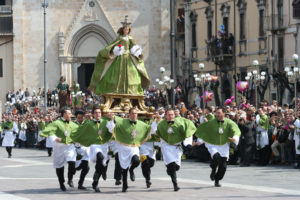According to reports, and I’m sure that those of us who are actually at World Youth Day can back this up, il Papa Benedetto has announced that he will declare St. John of Avila a Doctor of the Church. My thoughts, of course, immediately went to another Doctor of the Church from Avila: St. Teresa. I have been reading Interior Castle by St. Teresa and I am a fan. This announcement by His Holiness got me to thinking about the place of Spiritual Reading in our daily lives, but not only our personal lives but also in our Catholic Cultural Experience. When people think of World Youth Day, they often think of a) a Festival b) Charismatic Expression c) Music c) Action d) Youth Ministry etc. Although the reality may be a lot different, these are the perceptions from the outside. It is a Party. But I think the Pope has challenged us to see it as more (I’ve never actually been, which is why I say the reality is probably a lot different from the perception). He has introduced the idea of Spiritual Reading into the otherwise pretty enthusiastic atmosphere. Spiritual Reading has always been important to the life of Catholics which is why the Church provides us with especially good sources…the Doctors of the Church. In designating another Doctor, the Pope is emphasizing the importance of this practice. Of course the primary source of reading for Catholics is Sacred Scripture, but there are also secondary sources for spiritual enrichment. I myself have found these particularly edifying having a philosophical and intellectual bent.
I think that B16 is calling us to reclaim the contemplative aspect of our spiritual lives. We are a generation of action and oftentimes we forget to slow down in our desire to spread the word. This is an admirable attitude but with almost all attitudes, it can not keep itself up without nourishment. This attitude of Catholic Action is strengthened by the contemplation of truth through reading. And this is something that can be done on our own time without having to travel halfway around the world to see the Pope.
Now, I’m going to be in Rome all of next year for study abroad and so I will probably see the Pope quite frequently. However, as much as I am inspired by being in the Eternal City with the Heart of the Church mere minutes away, in order to truly grow in relationship with Christ and in order to grow a Catholic Culture, I will need to take a breather: silent prayer and contemplation on the Word of God and the words of his saints





2 thoughts on “Catholic Culture: Spiritual Reading”
Thank you for this little reminder of the importance of spiritual reading. Indeed, as I think of St. John of Avila, I recall also the great Dominican tradition which was established especially at Salamanca (where St. John had studied Law) and also at Alcala (where our newest Doctor studied under the great scholastic Dominican, Fr. Domingo de Soto [who was not yet a Dominican or a priest at the time that St. John studied under him]).
The Dominican tradition, which so influenced St. John of Avila (and, through him, also Sts. Teresa of Avila and John of the Cross) gives special importance to the practice of spiritual reading.
I am thinking especially of “The Nine Ways of Prayer” of our Holy Father St. Dominic, the eighth of which is spiritual reading! St. Dominic would retire to his cell, cross himself, and begin to reverently read from a holy book. Sometimes, he would kiss the book and bow before it, venerating the book as the means through which God was speaking to him.
Hmm, the connection between the Carmelites and Dominicans reminds me of the Community of St. John. Ever since I was introduced to the concept of Lectio Divina at Notre Dame (by a great Dominican by the way, Fr. Andrew Hofer), I have come to the realization that it is one of the most powerful means of discovering Divine Providence. The Eternal Word is being continually spoken to us (as our archbishop said in his homily this morning) and we only need to listen.